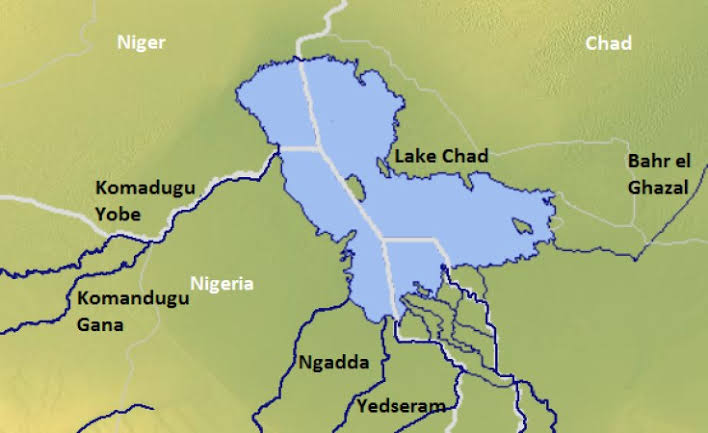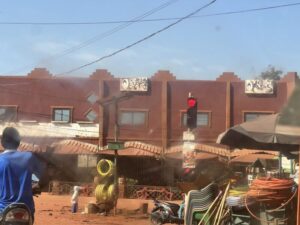Lake Chad Basin has faced numerous security challenges, including banditry, abduction, highway robbery, and cattle rustling. However, the most significant threat remains the Boko Haram crisis, which has weakened state functionality and human security in Cameroon, Chad, Niger, and Nigeria.
The insurgency has devastating consequences, including over 30,000 lives lost and more than 2.4 million people displaced. The humanitarian crisis has been exacerbated by the destruction of agricultural land, livestock, and essential assets, crippling the economy.
Agriculture, the backbone of the economy in Borno and Yobe states, has been severely disrupted, with many farmers unable to access their farmlands. Local farmers in Tarmuwa, Gulani, Gujba, Buni Yadi, Geidam, Magumeri, Monguno, Marte, Mafa, Goza, Askira Uba, Guzamala, and Zabarmari Local Government Areas (LGAs) in Borno and Yobe States have lost access to over 70% of their farmland.
Despite these hardships, stories of resilience and recovery emerge. Community-led initiatives have promoted peace and resilience, with self-help groups enabling families to access credit and start small businesses. In Yobe State, particularly in Gujba, local farmers have begun to adopt innovative agricultural practices to cope with the loss of traditional farming methods.
For instance, a group of women in Tarmuwa LGA has formed a cooperative focusing on cultivating drought-resistant crops, supported by NGOs providing training and resources. This initiative has enabled these women to regain some level of food security and independence.
Similarly, in Borno State, the community of Kaga has seen a remarkable transformation through the establishment of community gardens, supported by the Lake Chad Basin Commission’s Regional Stabilisation Strategy. Residents have come together to cultivate vegetables, generating income for families.
Aisha Yannabe, a local farmer, shared her story of how the garden initiative has helped her feed her children and pay for their education, highlighting community solidarity’s critical role in recovery efforts.
However, the region still faces significant obstacles, including limited resources, weak institutions, ongoing insecurity, and environmental degradation. Food insecurity affects over 400,000 people, exacerbated by farmers’ fear of working their land. Youth unemployment fuels recruitment into extremist groups.
To overcome these challenges, investing in sustainable agriculture, irrigation systems, and climate-resilient crops can enhance food security and generate income. Effective natural resource management leverages fertile land, abundant water, and mineral deposits for economic growth.
Strategic investments in infrastructure development, diversified livelihoods, and regional cooperation can unlock the Lake Chad Basin’s full potential. Implementing these strategies requires sustained commitment from governments, international partners, and local communities.
The Lake Chad Basin Commission plays a vital role in facilitating dialogue and cooperation among member states, addressing transboundary issues and promoting sustainable development. Community-led initiatives empower women and families, promoting economic growth and food security.
Traditional and religious leaders promote reconciliation and social cohesion. Local imams address conflict root causes through sermons and gatherings.
Despite challenges, the region presents opportunities for sustainable development and growth. Natural resources, including fertile land, abundant water, and mineral deposits, make it attractive for investment.
Promoting sustainable agriculture, irrigation systems, and climate-resilient crops enhances food security. Investing in infrastructure development upgrades roads, transportation networks, and energy access, facilitating trade and connectivity.
Diversified livelihoods reduce dependence on traditional agriculture, encouraging entrepreneurship and vocational training. Regional cooperation addresses shared challenges, enhancing resilience and stability.
The resilience of the Lake Chad Basin’s people serves as a powerful foundation for rebuilding and growth. With collective effort and strategic investment, the region can achieve economic growth, social progress, and environmental sustainability.
The people of the Lake Chad Basin have demonstrated remarkable resilience. Despite overwhelming challenges, they remain committed to rebuilding. Sustained support from governments, international organisations, and local stakeholders forges a brighter future.
Investing in sustainable infrastructure is crucial. Collective effort and strategic investment unlock the Lake Chad Basin’s full potential. A brighter future awaits, marked by hope, opportunity, and prosperity.
The Lake Chad Basin’s recovery journey necessitates perseverance, collaboration, and innovative solutions. Strengthening institutions and resource allocation, enhancing regional security and cooperation, are essential.
Regional cooperation enables the sharing of expertise, resources, and risk management. Countries develop comprehensive solutions to common problems like water scarcity, insecurity, and environmental degradation. This collective approach fosters ownership and accountability.
The Lake Chad Basin Commission plays a vital role in facilitating dialogue and cooperation among member states, addressing transboundary issues and promoting sustainable development. Community-led initiatives empower women and families, promoting economic growth and food security.
Self-help groups provide access to credit and small businesses. Traditional and religious leaders promote reconciliation and social cohesion. Local imams address conflict root causes through sermons and gatherings.
Despite challenges, the region presents opportunities for sustainable development and growth. Natural resources, including fertile land, abundant water, and mineral deposits, make it attractive for investment.
Promoting sustainable agriculture, irrigation systems, and climate-resilient crops enhances food security. Investing in infrastructure development upgrades roads, transportation networks, and energy access, facilitating trade and connectivity.
Diversified livelihoods reduce dependence on traditional agriculture, encouraging entrepreneurship and vocational training. Regional cooperation addresses shared challenges, enhancing resilience and stability.
Effective natural resource management leverages the region’s strengths for economic growth. Strategic investments unlock the Lake Chad Basin’s full potential. Substantial opportunities for sustainable development exist.
Leveraging natural resources, infrastructure development, diversified livelihoods, and regional cooperation offers a foundation for growth. Addressing challenges strengthens institutions and resource allocation.
The people of the Lake Chad Basin have demonstrated remarkable resilience. Despite overwhelming challenges, they remain committed to rebuilding. Sustained support from governments, international organisations, and local stakeholders forges a brighter future.
Through collective effort and strategic investment, the Lake Chad Basin unlocks its full potential. A brighter future awaits, marked by hope, opportunity, and prosperity.
The resilience of the Lake Chad Basin’s people serves as a powerful foundation. With commitment and support, this region emerges stronger, united, and determined.
The Lake Chad Basin’s recovery journey necessitates perseverance, collaboration, and innovative solutions.



